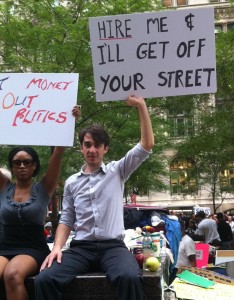Diverse in ideology and demands, many occupiers of Wall Street agree that jobs and the economy are central issues of their movement.
Protesters have gathered in Zuccotti Park for the last 26 days to express frustrations over a variety of ideas. Jobs and the economy have been hot topics of conversation amongst the occupiers.

Photo by Alex Robinson
“10 years ago you could select what company you wanted to work for and find a job very easily. Now you have to be on a list and send out 300 resumes without any promise of employment,” said Carlos Cabrera, a 34-year-old Brooklyn man who has been at the protest since its first day, September 17.
Cabrera was a paramedic for 12 years before losing his job. He has been unemployed for the last year and a half. Cabrera said that he has considered going back to school to rebrand himself, but it would put him in debt.
Sharon Kennedy, 62, a retired attorney for the state’s court system attended the protest for the first time today.
“Two of my three children are having trouble finding work. One has actually had to go to Korea to teach English for a couple years because he couldn’t find a job when he got out of college, so there’s a very direct impact on our family,” she said.
Kennedy attributes Occupy Wall Street to the recession and unemployment. She said that the recent economic downturn highlighted the long-standing social inequalities of the country.
“I’m here to express my support for the jobs bill because I think that it will create jobs and reduce some of the income inequity by making the wealthy pay more of their fair share then they do now,” she said.

